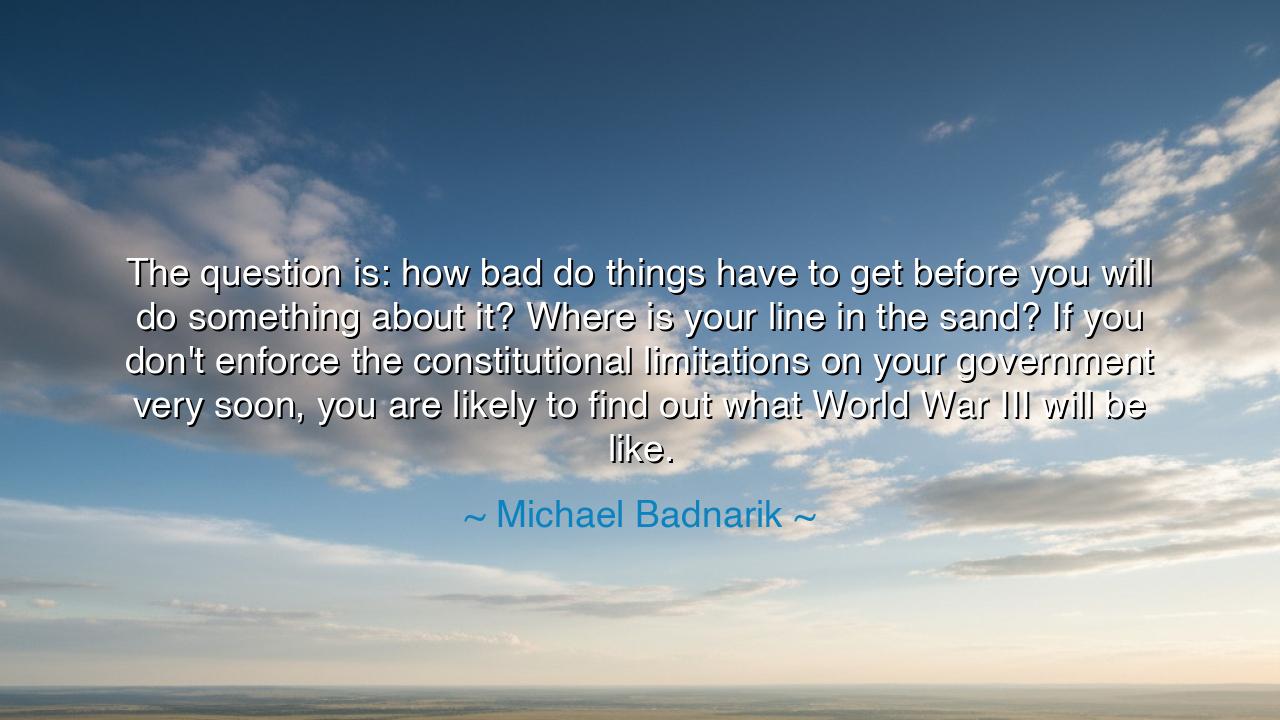
The question is: how bad do things have to get before you will do
The question is: how bad do things have to get before you will do something about it? Where is your line in the sand? If you don't enforce the constitutional limitations on your government very soon, you are likely to find out what World War III will be like.






"The question is: how bad do things have to get before you will do something about it? Where is your line in the sand? If you don't enforce the constitutional limitations on your government very soon, you are likely to find out what World War III will be like." – Michael Badnarik
In these fierce and sobering words, Michael Badnarik, the libertarian thinker and defender of constitutional freedom, speaks not merely as a philosopher, but as a herald warning a sleeping nation. His question is not rhetorical—it is a mirror, held before the conscience of every free people. He demands that we confront our apathy, that we ask ourselves the most ancient and terrible question: “When will you resist?” His voice carries the same fire that once stirred the hearts of patriots in every age who stood between tyranny and liberty. He warns that freedom, once surrendered to neglect, is never returned without struggle—and that if the people do not defend their Constitution, they will be forced to defend their lives.
The origin of this quote lies in Badnarik’s lifelong crusade to educate citizens about the U.S. Constitution and the principles of self-governance. A man of law and liberty, he saw how the slow erosion of rights—by executive overreach, bureaucratic expansion, and public indifference—threatened to undo the very foundation of the republic. His words are not the cry of an extremist, but of a guardian who sees the storm forming on the horizon while others remain lulled by comfort. Like the prophets of old, he speaks with urgency and sorrow, warning that the decay of freedom always begins with the silence of the free.
His question—how bad do things have to get before you will act?—is as old as civilization itself. History is filled with the graves of nations that waited too long to remember their duty. Consider the fall of the Roman Republic, once the beacon of law and order in the ancient world. When its citizens ceased to guard their Constitution, when they traded liberty for the false security of empire, the Senate became a shadow, the law a tool of power, and the people subjects of their own government. The Romans did not lose their freedom in a single night of conquest; they lost it gradually—through apathy, through fear, through the slow acceptance of injustice. And when they finally awoke, it was to the rule of tyrants.
Badnarik’s warning is not confined to the past—it speaks vividly to the present. In every era, governments, like all human institutions, tend toward expansion and control. They justify it in the name of safety, equality, or progress. Yet each encroachment, however small, eats away at the sovereignty of the citizen. When unchecked, it leads to a society where obedience replaces participation, where law serves rulers instead of the ruled. Badnarik’s invocation of World War III is not literal alone—it is symbolic of the chaos that erupts when people abandon vigilance. For when freedom dies quietly in peace, it is reborn only through fire.
There is a deeper, moral truth in his words. To “draw a line in the sand” is to reclaim the dignity of conscience—to say, “Thus far and no farther.” It is the act that transforms passive citizens into active defenders of justice. Every generation must draw its own line, for tyranny changes its face with time. In one age it comes as a king; in another, as bureaucracy. In one, it wears armor; in another, it wears a suit. The form matters little—the duty remains the same. The guardianship of liberty is not the burden of heroes alone; it is the sacred inheritance of all free souls.
History gives us examples of those who answered this call. Think of Lech Wałęsa and the Polish Solidarity movement, who stood against the might of Soviet oppression not with guns, but with courage and conviction. They were ordinary men and women who drew their line in the sand, who refused to surrender their dignity to the machinery of power. Their struggle restored not only their nation’s freedom but also the moral balance of a world drifting toward tyranny. They proved that the will of the people, when awakened, is mightier than any army or empire.
The lesson, then, is eternal: freedom is not inherited—it is earned, guarded, and renewed through vigilance. Constitutions and charters are not self-enforcing; they are only as strong as the people who live by them. The price of liberty, as Jefferson warned, is eternal vigilance. To ignore this duty is to invite decay; to delay action is to court disaster. Badnarik’s words are not meant to frighten—they are meant to awaken, to rekindle the fire of self-governance before it is extinguished by complacency.
And so, the practical actions are clear: learn the principles of your Constitution, and teach them to others. Question authority, not out of rebellion, but out of responsibility. Hold leaders accountable to the laws they swear to uphold. Refuse the comfort of silence when justice is threatened. For if you will not defend your liberty in peace, you will be forced to fight for it in war. The time to draw your line in the sand is not “someday.” It is now—because, as Michael Badnarik reminds us, a free people who will not enforce their laws will soon live under laws not their own.






AAdministratorAdministrator
Welcome, honored guests. Please leave a comment, we will respond soon